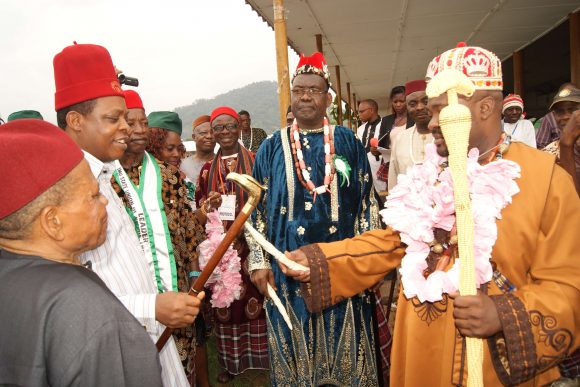A new consciousness is gradually enveloping Ndi Igbo, and it has to do with what role it will play as the nation grapples with power-sharing come 2023. The momentum that it has gathered so far in the zone indicates that the time for that discussion is now.
However, as alignment and re-alignments continue, the main political actors are divided into three broad groups- those angling for an Igbo Presidency come 2023, those clamouring for a restructuring of the polity, as well as those who are only interested in the declaration of a Sovereign State of Biafra.
The need to restructure the Nigerian state has gained populist currency in the past few years. Especially, since after the recent elections, it has become a consensus call coming from almost all the ethnical, political, and geographical sections that make up the corporate Nigerian state.
Read Also: Nwodo: Restructuring Will End Rotational Presidency Fracas
Recently the champions of this call for a new and different Nigeria have gained an overwhelming numerical strength. Therefore their voices are increasingly getting stronger, louder, and urgent. The fear and seemingly mysterious fog that earlier surrounded this now deafening call for change and the enthronement of a new order seems to have suddenly cleared up. And now with a clearer picture the argument to restructure Nigeria becomes more compelling and can simply not be ignored or wished away any longer by those who traditionally oppose it.
As the days go by the rank of those in opposition of a restructured Nigeria continues to decline and pale in the face of so many incontestable and overpowering evidences in support. It has now become clear that the current Nigerian state does not and cannot work as it is presently structured.
The majority of the country’s stakeholders have finally accepted that the existing Nigerian state structure is not viable and cannot be sustained any much longer. Many genuine patriotic Nigerians are seeking real solutions and a considerable majority tends to believe that what is needed is a Nigeria that works on a structure where the diverse ethnical, political, religious, and social units form a confederating union.
What will be considered as being very vital at the moment is for the continued persecution and clamour for straight, definite restructuring which would put the Igbos at par with other ethnic groups in the country.
Nigeria currently exists on a structure that is centrally controlled or administered – a federal government. It has been like this since the military intervention of January 1966. In order to effectively control the political turmoil and mayhem taking place in the Western Region of the country and forestall the unconscionable corruptive and overarching manipulations of the federal power by the politicians who wielded its reigns, the army, which took power through a military coup d’état, adopted the federal government structure effective immediately. During the past 50 years, practical experiences and ensuing events have shown clearly that this centralised control of natural resources and political power is not working for the country.
Hence the need for something new, something different.
That something new is the now much talked about restructured Nigeria. An important highlight of this now popular and highly recommended restructuring is the fact that the advocates want much of the powers for the day-to-day running of the grassroots components of Nigeria to be vested in the local governments of the different contiguous regions.
Ndi Igbo should leave out the Biafran struggle and focus on the restructuring struggle of Nigeria because whilst the demean the importance of restructuring and struggle for succession, the Northern conglomerate is spreading its webs into the southeast region and siphoning away huge amounts of necessary resources to enrich themselves.
Despite so many years of conventions, consultations, and gatherings, the international community has not shown any tangible interest in the support of the Biafran realisation.
Ndi Igbo stand to gain a lot of things if the Nigerian-state is restructured.
The control of regional natural resources, law enforcement, and decentralised leadership. There is also the subject of restructured social, cultural and political-economic systems of Igbo land and the surrounding regions.
This is to pave way for more development and better healthy competition between major regions and ethnic groups in Nigeria.
Most importantly, this envisaged new arrangement will enable the different regional power centers to develop and grow at their own pace, without unduly interfering with or holding up their neighbors.
It is expected that with this new arrangement the central government can exclusively control the collective national military, external affairs, some aspects of the judiciary, and other matters as are determined to represent a federal, united Nigerian image and interest.
AFRICA TODAY NEWS, NEW YORK

